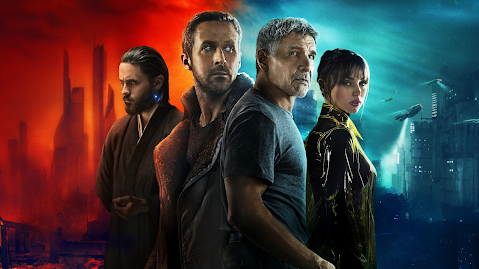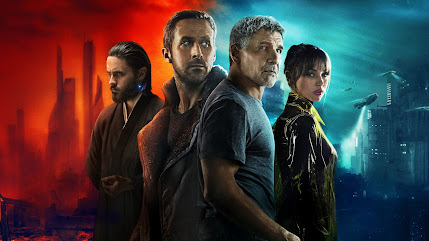California, 2049. Blade Runner "K" retires an old-model replicant who is pursuing a life of peace on a remote farm. In the process he unearths a secret, something that has remained buried since before the epoch-changing event known as The Blackout. Charged by his superiors with investigating this mystery, he follows a trail that leads him from the tech-canyons of Los Angeles to the dumps of San Diego to the radioactive wastes of Las Vegas. It's also a journey into his own heart and forces him to confront the question of who he is, and what it is he lives for.
Blade Runner 2049 is a movie that should not work.
Blade Runner - a loose adaptation of Philip K. Dick's novel
Do Androids Dream of Electric Sheep? - was a movie rooted in ambiguity, in which far more was left unsaid than spoken out loud and where the still-astonishing visuals masked a strong vein of character and thematic subtlety. The film's ending seems to explicitly reject further exploration of that world, and three disappointing sequel novels (by K.W. Jeter, a friend of Philip K. Dick's and fellow traveller in SF dystopian fiction) only reinforced that idea. The announcement that Ridley Scott was helming a sequel to do to
Blade Runner what
Prometheus did to
Alien was enough to make movie fans break out in a cold sweat, only moderately alleviated when Scott bailed and a director no-one had heard of was announced in his stead.
That director, Denis Villeneuve, had already some intriguing form in movies like
Sicario, but it was last year's
Arrival that made people really sit up and take notice. A beautifully-shot movie with a pace that was relaxed but intense, stand-out performances and a phenomenal sense of atmosphere,
Arrival was a stand-out work, a piece of art that also worked as a strong science fiction piece. And
Blade Runner 2049 is the same, but even moreso. It is a virtuoso triumph that on absolutely no level should work, but on almost every level it does.
Blade Runner took us deep into the streets of a future (and now - in two notable moments - explicitly alternate history) Los Angeles, with neon-lit grime and rain-soaked futurism.
Blade Runner 2049 revisits the city - which is now larger, even more imposing and less human - but relatively briefly. Instead we spend a lot of time on the outskirts of the city, in the grey-soiled remnants of California, in a San Diego turned into an vast industrial wasteland and a Las Vegas slowly being swallowed by the desert. When you think of
Blade Runner you think of those towering tech-pyramids, and for Villeneuve to minimise that imagery in the movie's sequel is a brave move, but one that exemplifies his goal with this film: to craft a successor to
Blade Runner, not a retread. And it's a successor on every level, with the core question of the original movie, what does it mean to be human, taken to an even higher and more ambiguous level.
Blade Runner 2049 very quickly identifies its protagonist as a replicant and one who seems to be relatively content with his lot, complete with an AI girlfriend and a good working relationship with his boss, but a few key moments of revelation see him going down a path of self-discovery that is a reflection of Rachael (and Deckard if you subscribe to that theory, a theory that this movie cheerfully does nothing to confirm or deny) in the first film. What are the replicants? Unthinking, soulless machines or a new type of human, one that is stronger, faster and smarter than the originals? Is using them a slaves even remotely morally justifiable? The fact that human civilisation on Earth and in the offworld colonies would collapse without them makes it very easy for the "real" humans to ignore the question, and the introduction of a new breed of replicant that is 100% loyal and obedient seems to render the question moot. Enslaving a race that seems to have no qualms about being enslaved makes it easy to pretend it's not slavery at all. At least, until one very small secret is learned and turns the entire world on its head.
Blade Runner 2049 understands that the simplicity of the original
Blade Runner was a key part of its success: the plot was pretty bare bones and the sequel follows suit, the main plot being a simple (ish) missing persons case. But K's following of the clues becomes unexpectedly harrowing, revealing greater depths to this world and the existence of his own kind. Villeneuve and writers Hampton Fancher and Michael Green have taken the set-up from the first movie and extrapolated a storyline that follows it up perfectly, without damaging the integrity of the first movie in any way. The film even pays homage to some of the futuristic dystopian movies that have come in its way, with several brief nods to the numerous
anime (but most famously
Akira and
Ghost in the Shell) that have borrowed the original
Blade Runner's visual stylings. The film also gives us the weirdest love scene since
Ghost, although one that is also altogether healthier and more positive than the original movie's rather debatable relationship between Rachael and Deckard.
This film works tremendously well. The cast is excellent, Ryan Gosling in particular doing a lot of work with his eyes and his reactions to the revelations he encounters. Robin Wright as his boss is perfect, the steely resolve we've come to expect of her mixed with several unexpected, and all the more effective, moments of real human vulnerability. Sylvia Hoeks as replicant enforcer Luv is terrifying, blank-eyed and emotionless when carrying out violence, but she also occasionally shows what she really thinks of what's going on through flashes of honest emotion. Jared Leto is okay as new tech-king Wallace, but he does get the lion's share of ripe dialogue in the film. He's only in two scenes of consequence and they're both the more interminable scenes of the movie. The film's biggest revelation is Ana de Armas, a young Cuban actress who is given a very difficult role as Joi and carries the role with charisma, sweetness and resolve (even if her storyline may make fans of the animated series
Archer do a double take).
Harrison Ford shows up again as Deckard and is perfectly fine, showing charisma and cynical humour in his role. This is actually a bit distracting - Deckard was very much an un-Harrison Ford-ish role, reserved and cold and undemonstrative compared to Indiana Jones or Han Solo - since Ford plays the older Deckard more as a subdued version of Han Solo in
The Force Awakens. I enjoyed his performance, but I didn't really believe I was seeing the same Deckard as in
Blade Runner, just thirty years older. This would be a bigger blow to the film if Ford was actually in it for any substantial amount of time, or if his role was integral to the movie. Although Ford's presence allows for some excellent moments of reflection and soul-searching (including what may be the greatest special effect in film history, to the point where I eagerly await learning how the hell they did it), the same story could easily have been told without him.
Another negative is the score. It's certainly not bad, but it lacks a theme as memorable as anything in
Arrival. Johan Johansson began composing this movie but was ousted in favour of Hans Zimmer, who then hands in a completely unmemorable Johan Johansson cover work, which is one of the more bizarre scoring decisions I've seen in recent years. I appreciate that no-one was trying to out-Vangelis Vangelis, but the decision to go in a different, more traditional direction and then make a hash of it is disappointing.
Blade Runner 2049 (
*****) does the impossible: it crafts a sequel, a successor and a subversion which respects the original whilst not being afraid to be different from it, that knows what made the original film work without slavishly copying it and which raises many of the same questions in a different way. The combination of story and visuals has profound thematic and character consequences which will drive as much discussion about this story as it did the original, as will the somewhat open ending. If this film does well expect a third trip to the
Blade Runner universe, and we'll probably not have to wait another thirty-five years for it. Part of me hopes the movie
doesn't do well: the story wraps up well enough and the only place the story can go in a third film is a very familiar one.
Blade Runner 2049 is on general release now. Villeneuve's next movie will be the holy grail of SFF adaptations,
Dune. Right now, I think he can actually do it justice.





